 | | | As February unfolds, winter's chill lingers over much of the country, but the ocean remains a dynamic force, shaping our understanding of marine life, conservation, and climate resilience. As we move deeper into 2025, the ocean continues to demand our attention — both for its breathtaking beauty and the challenges it faces. 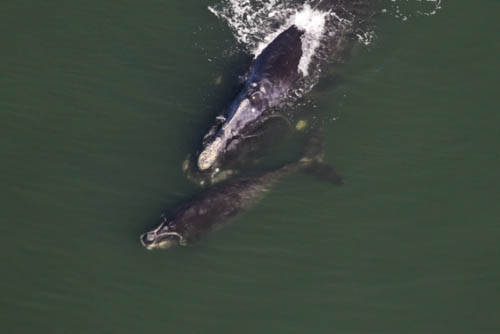 In this month’s issue of the RCC Coasts and Ocean Observer, we celebrate the sighting of two new North Atlantic right whale calves off New Jersey and Florida – hopeful news for one of the world's most endangered whale species. Yet, political shifts could jeopardize marine protections, with concerns growing over how another Trump presidency will impact ocean and coastal wildlife policies. Conservationists continue their vital work, from whale rescue efforts in California to innovative ocean education programs like the Whalemobile project in Rochester. Meanwhile, a deep-sea fish recently surfaced in shallow waters – briefly becoming a TikTok sensation – reminding us how much remains unknown about the ocean’s depths. In this month’s issue of the RCC Coasts and Ocean Observer, we celebrate the sighting of two new North Atlantic right whale calves off New Jersey and Florida – hopeful news for one of the world's most endangered whale species. Yet, political shifts could jeopardize marine protections, with concerns growing over how another Trump presidency will impact ocean and coastal wildlife policies. Conservationists continue their vital work, from whale rescue efforts in California to innovative ocean education programs like the Whalemobile project in Rochester. Meanwhile, a deep-sea fish recently surfaced in shallow waters – briefly becoming a TikTok sensation – reminding us how much remains unknown about the ocean’s depths. 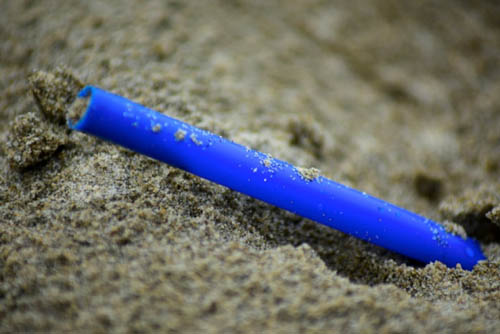 Plastic pollution persists as a pressing issue, but emerging research suggests marine fungi might help break down plastic debris, a potential breakthrough in ocean cleanup. Unfortunately, political decisions threaten to undermine progress, with President Trump championing a return to plastic straws, despite their well-documented environmental harm. In the Arctic, scientists are examining how climate-driven shifts in ocean currents are exacerbating plastic pollution in fragile ecosystems. Plastic pollution persists as a pressing issue, but emerging research suggests marine fungi might help break down plastic debris, a potential breakthrough in ocean cleanup. Unfortunately, political decisions threaten to undermine progress, with President Trump championing a return to plastic straws, despite their well-documented environmental harm. In the Arctic, scientists are examining how climate-driven shifts in ocean currents are exacerbating plastic pollution in fragile ecosystems.
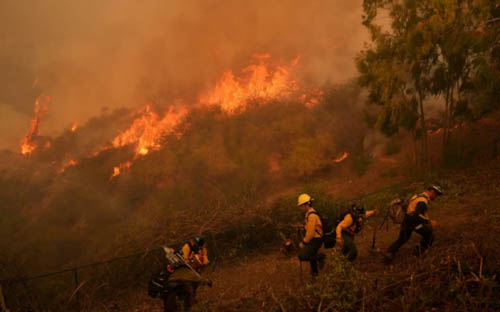 The intersection of climate change and coastal ecosystems is becoming increasingly evident. In LA, the recent wildfires have resulted in immeasurable losses. Please know our thoughts are with the victims of these horrible events. While the severity and frequency of these wildfires is exacerbated by climate change, this month's issue explores how these fires are taking a toll on marine life as well, with scientists racing to understand the full extent of the damage. Meanwhile, in some of the world's most remote regions, rising sea levels threaten historical sites, leading researchers to explore whether digital preservation could be a viable solution. The urgent need for coastal resilience is also evident on campus, with a new coastal engineering major announced at Syracuse University, emphasizing the growing demand for expertise in protecting our shorelines. The intersection of climate change and coastal ecosystems is becoming increasingly evident. In LA, the recent wildfires have resulted in immeasurable losses. Please know our thoughts are with the victims of these horrible events. While the severity and frequency of these wildfires is exacerbated by climate change, this month's issue explores how these fires are taking a toll on marine life as well, with scientists racing to understand the full extent of the damage. Meanwhile, in some of the world's most remote regions, rising sea levels threaten historical sites, leading researchers to explore whether digital preservation could be a viable solution. The urgent need for coastal resilience is also evident on campus, with a new coastal engineering major announced at Syracuse University, emphasizing the growing demand for expertise in protecting our shorelines. On the climate and energy front, offshore wind remains a contentious issue. A recent executive order from President Trump seeks to freeze offshore wind leasing, but experts suggest this move may have limited impact in some regions, leaving room for continued investment in renewable energy. Elsewhere, researchers are studying the role of microscopic marine organisms in regulating the global carbon cycle, offering insights into their climate impact. Sustainable fisheries remain a key topic, as policymakers debate whether recreational fisheries should be managed separately. Concerns also grow over misleading sustainability labels that may obscure labor abuses in the high-seas fishing industry. Meanwhile, amendments to existing laws are strengthening efforts to remove derelict fishing gear, an important step in tackling marine pollution at its source. For those eager to engage with marine conservation, February brings exciting opportunities! A new marine conservation science and policy textbook is inviting public input, ensuring diverse perspectives shape future ocean education. The prestigious Peter Benchley Ocean Awards are also open for ticket sales and sponsorships, celebrating outstanding contributions to ocean conservation. 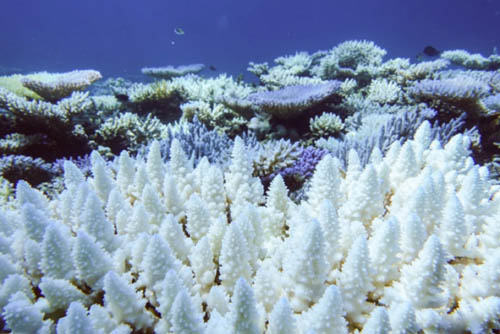 This month’s featured film, Chasing Coral, highlights the devastating effects of coral bleaching, documenting the tireless efforts of scientists fighting to save reefs. Meanwhile, our recommended read, Four Fish: The Future of the Last Wild Food by Paul Greenberg, explores humanity’s complex relationship with seafood and the path to a more sustainable industry. This month’s featured film, Chasing Coral, highlights the devastating effects of coral bleaching, documenting the tireless efforts of scientists fighting to save reefs. Meanwhile, our recommended read, Four Fish: The Future of the Last Wild Food by Paul Greenberg, explores humanity’s complex relationship with seafood and the path to a more sustainable industry.
As winter gives way to spring, let’s stay committed to protecting our oceans, supporting conservation efforts, and staying informed about the policies and innovations shaping the future of our marine environments, especially in the face of new administration and policies affecting marine life. Here’s to another month of learning, action, and appreciation for the vast blue world that connects us all. | | | | | | | |  RCC Presidential Fellow – Jack Sanitate RCC Presidential Fellow – Jack Sanitate
RCC Presidential Fellow, Jack Sanitate, is a senior at Duke University double majoring in Public Policy and Theater Studies, with a minor in Environmental Sciences & Policy. Jack serves as the co-lead of the RCC Coasts and Ocean program with Bob Musil and editor of the RCC Coasts and Ocean Observer. | | | | | | Two New Right Whale Calves Spotted Off Coasts of NJ, FL The two new right whale calves were spotted with their mothers Accordion and Cashew this week, bringing the season's total calves to nine. Two new right whale calves spotted in two days makes for an exciting start to February for one of our most endangered whale species. Seen hundreds of miles apart, the newest right whales were born to moms Accordion and Cashew. | | | | | | | | Donald Trump’s Second Term Will Be Bad News for Endangered Ocean and Coastal Animals The re-election of Donald Trump has scientists and conservationists like me worried about the wildlife and wild places we’ve dedicated our lives to protecting. This is especially true for ocean and coastal natural resource management and endangered species conservation, given Trump’s ongoing rhetoric. He’s attacked climate science and supported a plan to dismantle the National Oceanic and Atmospheric Administration. | | | | | | | | As Oceans Warm, Predators Are Falling Out of Sync with Their Prey For decades on the U.S. Mid-Atlantic coast, recreational anglers have braved the cold temperatures of late October and November to chase one of the region’s most iconic fish species, the striped bass. This season, just offshore of New Jersey and New York, the fall run was especially strong. “The amount of fish and [their size] was really, really high,” said Lou Van Bergen, a captain of Miss Barnegat Light, a 90-foot party boat out of Barnegat Light, New Jersey. “Every week, all the way through Thanksgiving, you could go out and catch nicer-sized fish.” | | | | | | | | Meet the Women Rescuing Whales in California Peggy Stap spots a whale as soon as we leave the harbor. Its distinctive white plume of a spout shoots straight into the air, perfectly framed by a bright-blue sky and a calm, equally blue ocean. Stap has seen the animal thousands of times, and this whale, a humpback, is one of the most common in her home waters of Monterey Bay in California. But to her, the experience never gets any less special. “Humpback whales are my greatest love,” she says. “They changed my whole life.” | | | | | | | | A Deep-Sea Fish of Nightmares Strays Into Shallow Waters Strange things live in the depths of the ocean. Even the light of the sun cannot penetrate the inky blackness below. The pressure of the water above is crushing. And yet life somehow survives, adapted to that strange world. Many of the fish there are partly luminescent to attract prey. They are omnivores, making up for the lack of food at those depths by having big mouths, sharp teeth and a desire to eat almost anything. | | | | | | | | Rochester Students Dive Into Marine Life With Whalemobile Students in Rochester experienced a deep-sea adventure without leaving their city, thanks to an educational event hosted by the Rochester City School District 34. The event featured the Whalemobile, a life-size, 40-foot inflatable whale, which provided an immersive learning experience. The Whalemobile allowed students to explore the life and mechanics of these magnificent marine mammals. The event also highlighted the threats whales face in our oceans, offering a comprehensive lesson in marine conservation. | | | | | | | | Marine Fungi Could Eat Plastic Pollution, Helping to Clean Our Oceans and Beaches Hawaii is home to some of the world’s most beautiful landscapes. Striking blue waters, lush jungles, and pristine beaches make it a paradise. It’s also home to other unique inhabitants, such as sea turtles, dolphins, and… plastics? According to a new study from the University of Hawai‘i (UH) at Mānoa, plastics are becoming the most prevalent form of pollution in the ocean, which can be detrimental to marine species and their habitat. | | | | | | | | ‘Back to plastic': Trump Signs Order For Plastic Straws as He Declares Paper Ones ‘don’t work’ Trump declared President Joe Biden’s policy “DEAD!” in a social media post over the weekend. While plastic straws have been blamed for polluting oceans and harming marine life, Trump said Monday that he thinks “it’s OK” to continue using them. “I don’t think that plastic is going to affect the shark very much as they’re eating, as they’re munching their way through the ocean,’' he said at a White House announcement. | | | | | | | | | | Malibu’s Ocean Life Isn’t Safe From Fire, and the Worst Effects Are Yet to Come The Palisades Fire destroyed thousands of structures and killed 12 people. Now, as fire victims gather their lives after the destruction, environmental concerns have emerged in the region. Urban fires pose particular threats to marine ecosystems. Debris and toxins released from the fires can damage kelp forests and lead to destructive algal blooms that snuff out ocean life. Now that Los Angeles is finally seeing some much needed rain, the worst effects in the ocean are expected to begin. | | | | | | | | Polar Heritage Sites Are Slipping Into the Sea – But Can One Island Live Forever Online? On Qikiqtaruk, off Canada’s Yukon coast, scientists are wielding virtual-reality cameras, 3D models and digital archives to protect the island’s history and culture before it disappears. It was early July when the waters of the Beaufort Sea crept, then rushed, over the gravel spit of a remote Arctic island. For hours, the narrow strip of land, extending like the tail of a comma into the waters, gradually disappeared into the ocean. | | | | | | | | Scientists Are Racing to Discover the Depth of Ocean Damage Sparked By Wildfires On a recent Sunday, Tracy Quinn drove down the Pacific Coast Highway to assess damage wrought upon the coastline by the Palisades Fire. The water line was darkened by ash. Burnt remnants of washing machines and dryers and metal appliances were strewn about the shoreline. Sludge carpeted the water's edge. Waves during high tide lapped onto charred homes, pulling debris and potentially toxic ash into the ocean as they receded. | | | | | | | | SU Announces New Coastal Engineering Major Salisbury University is addressing the growing demand for licensed engineers as the first in Maryland to offer a coastal engineering major. The program focuses on solving problems in coastal environments and preparing students through hands-on, project-based instruction in not only physics and engineering but also geosciences and geographic information science. | | | | | | | | Trump's Pause On Offshore Wind Leasing May Have Limited Impact in New England A national moratorium on offshore wind leasing and permitting may have only limited effects in Massachusetts and other New England states, according to several wind industry observers. Their comments came after Trump signed an executive order halting federal approvals for wind energy projects on Monday, his first official day in office. | | | | | | | | Seeking Climate Connections Among the Oceans’ Smallest Organisms MIT oceanographer and biogeochemist Andrew Babbin has voyaged around the globe to investigate marine microbes and their influence on ocean health. Andrew Babbin tries to pack light for work trips. Along with the travel essentials, though, he also brings a roll each of electrical tape, duct tape, lab tape, a pack of cable ties, and some bungee cords. “It’s my MacGyver kit: You never know when you have to rig something on the fly in the field or fix a broken bag,” Babbin says. | | | | | | | | Trump’s Offshore Wind Energy Freeze: What States Lose If the Executive Order Remains in Place A single wind turbine spinning off the U.S. Northeast coast today can power thousands of homes – without the pollution that comes from fossil fuel power plants. A dozen of those turbines together can produce enough electricity for an entire community. The opportunity to tap into such a powerful source of locally produced clean energy – and the jobs and economic growth that come with it – is why states from Maine to Virginia have invested in building a U.S. offshore wind industry. | | | | | | | | Trump Creates Council For ‘energy dominance,’ Boosts Natural Gas Exports and Offshore Drilling President Donald Trump on Friday signed an executive order formally creating a National Energy Dominance Council and directed it to move quickly to drive up already record-setting domestic oil and gas production. Trump’s administration also announced it has granted conditional export authorization for a huge liquefied natural gas project in Louisiana, the first approval of new LNG exports since former President Joe Biden paused consideration of them a year ago. | | | | | | | | Law Amended to Enhance Clean Up of Derelict Fishing Gear A new law has provided DMF, through its Marine Fisheries Advisory Commission, with the authority to regulate and permit certain removal and disposal activities. This amends an antiquated law—dating back to a time of salvageable wooden traps—that bestowed property rights to this gear at sea and on shore and afforded its owners 30-days to recover the gear washed ashore and 60-days before property rights were ceded to the upland owner. | | | | | | | | Should Recreational Fisheries Be Split Into Two Management Sectors? Public Input Sought Should party boats have different regulations for fluke than, say, surf fishermen? The Atlantic States Marine Fisheries Commission and the Mid-Atlantic Fishery Management Council are floating an idea to split several recreational fisheries into two separate management sectors, a strategy that fishermen have raised before at fishery meetings but never really got any air under it. | | | | | | | | NGOs Warn That Sustainable Seafood Label May Hide High-Seas Labor Abuses The Marine Stewardship Council (MSC) finds itself under fire again over its vetting standards, this time for allegedly overlooking the use of forced labor in overseas fisheries. A coalition of environmental and labor NGOs has called on MSC to acknowledge that its label may not be "fit for purpose" for evaluating labor standards in the complex, opaque seafood supply chain. | | | | | | | | We’re Making a New Marine Conservation Science and Policy Textbook. What Do You Want to Be In It? The leading textbook in Marine Conservation Biology (Norse and Crowder) is 20 years old. It’s great and it shaped the field for a generation, but a lot has happened since it came out. There are new conservation threats, new policy tools, and new research methods to study them. And in that time, we’ve radically changed how we approach a lot of these questions. | | | | | | | | Peter Benchley Ocean Awards 2025 Tickets & Sponsorships Now Available Inaugural awards gala will be held on 8 May at the National Aquarium in Baltimore, US, in partnership with ACP The awards honour Peter Benchley, the author of the beloved book Jaws and a lifelong advocate for shark conservation and ocean preservation. Dubbed the “Academy Awards for the Ocean,” they recognise those that offer innovative solutions to issues impacting the ocean, ecosystems, species, and climate in a diverse range of fields. | | | | | | | | | 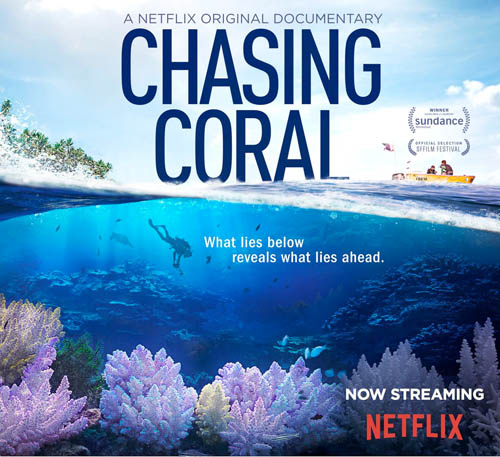 Synopsis on showtimes.com: “Coral reefs are the nursery for all life in the oceans, a remarkable ecosystem that sustains us. Yet with carbon emissions warming the seas, a phenomenon called ‘coral bleaching’ – a sign of mass coral death – has been accelerating around the world, and the public has no idea of the scale or implication of the catastrophe silently raging underwater. Chasing Coral taps into the collective will and wisdom of an ad man, a self-proclaimed coral nerd, top-notch camera designers, and renowned marine biologists as they invent the first time-lapse camera to record bleaching events as they happen. Unfortunately, the effort is anything but simple, and the team doggedly battles technical malfunctions and the force of nature in pursuit of their golden fleece: documenting the indisputable and tragic transformation below the waves. With its breathtaking photography, nail-biting suspense, and startling emotion, Chasing Coral is a dramatic revelation that won't have audiences sitting idle for long.” Synopsis on showtimes.com: “Coral reefs are the nursery for all life in the oceans, a remarkable ecosystem that sustains us. Yet with carbon emissions warming the seas, a phenomenon called ‘coral bleaching’ – a sign of mass coral death – has been accelerating around the world, and the public has no idea of the scale or implication of the catastrophe silently raging underwater. Chasing Coral taps into the collective will and wisdom of an ad man, a self-proclaimed coral nerd, top-notch camera designers, and renowned marine biologists as they invent the first time-lapse camera to record bleaching events as they happen. Unfortunately, the effort is anything but simple, and the team doggedly battles technical malfunctions and the force of nature in pursuit of their golden fleece: documenting the indisputable and tragic transformation below the waves. With its breathtaking photography, nail-biting suspense, and startling emotion, Chasing Coral is a dramatic revelation that won't have audiences sitting idle for long.” Click here to watch on YouTube Click here to watch on Netflix | | | | | | | 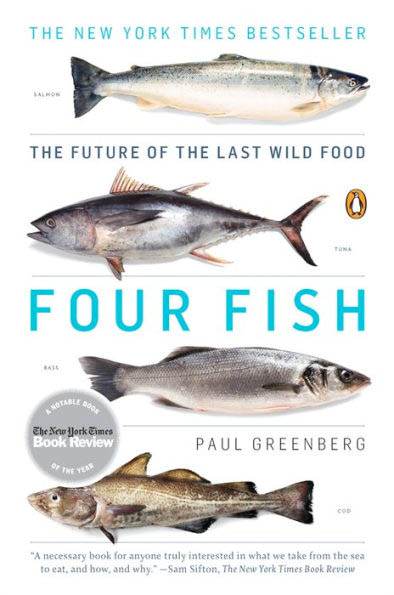 Overview: “Acclaimed author of American Catch and The Omega Principle and life-long fisherman, Paul Greenberg takes us on a journey, examining the four fish that dominate our menus: salmon, sea bass, cod, and tuna. Overview: “Acclaimed author of American Catch and The Omega Principle and life-long fisherman, Paul Greenberg takes us on a journey, examining the four fish that dominate our menus: salmon, sea bass, cod, and tuna.
Investigating the forces that get fish to our dinner tables, Greenberg reveals our damaged relationship with the ocean and its inhabitants. Just three decades ago, nearly everything we ate from the sea was wild. Today, rampant overfishing and an unprecedented biotech revolution have brought us to a point where wild and farmed fish occupy equal parts of a complex marketplace.
Four Fish offers a way for us to move toward a future in which healthy and sustainable seafood is the rule rather than the exception.”
“A necessary book for anyone truly interested in what we take from the sea to eat, and how, and why.” —Sam Sifton, The New York Times Book Review. Click here to purchase | | | | | | The February 2025 issue of RCC's Coasts and Ocean Observer was produced by Ross Feldner | | | | | |  The Rachel Carson Council Depends on Tax-deductible Gifts From Concerned Individuals Like You. Please Help If You Can. The Rachel Carson Council Depends on Tax-deductible Gifts From Concerned Individuals Like You. Please Help If You Can. | | | | | | | |  Sign Up Here to Receive the RCC E-News and Other RCC Newsletters, Information and Alerts. Sign Up Here to Receive the RCC E-News and Other RCC Newsletters, Information and Alerts. | | | | | | | | | | | |